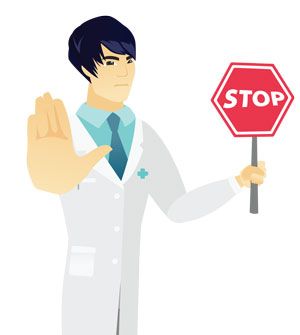Why Neurologists in the US Don't Recommend HSCT (Month +35.8)

I recently filmed a lecture for the local MS group. The MS genius, Dr. Timothy West, gave a fantastic 30,000 ft view of the world of multiple sclerosis from his point of view as a practicing clinician. He covered all the new technologies, current treatments, and the myriad of choices he must make in treating patients.
Someone in the audience asked, "What about stem cell replacement?" There were two interesting parts to Dr. West's answer.
First, he said that a patient's assessment of his illness is much worse than how a doctor perceives it. That sounds plausible to me, almost to a frustrating level.
Second, he said Western medicine doctors are obligated to the Hippocratic Oath, which states, "First, do no harm." According to societal norms, it's better for a doctor to do nothing and watch his patient slowly die than to intervene with a powerful drug and accidentally kill the patient. This is true even if the drug has a good chance of curing the patient and potentially saving his life. Doctors don't have the option of risking life if there's a less dangerous way. Think about the liability here.
Add those two thoughts together. The patient thinks he's in dire straights, willing to risk his horrible life to save a more normal one. But the doctor must "do no harm," so he must avoid administering a highly-effective treatment with a high mortality rate. Half of neurologists consider a mortality rate of 1:5,000 to be too high of a risk, yet only 17% of patients consider that too high. HSCT has a mortality rate in the ballpark of 1:500, maybe more, so it is considered very high. Other therapies have mortality rates of hundreds of times less. Forget that they only slow down MS; they don't stop it.
I finally understand why Dr. West did not tell me about HSCT, leaving it up to me to discover and choose it for myself.
Another fascinating thing I picked up from this lecture was that the MS medication industry focuses most energy on treating people in the early disease stage. Studies show that treatment during this period can be significantly more efficacious than treatment during later stages, so the net benefit is higher. Of course, this idea can be rather depressing for many later-stage patients.
Important Timeframes
- My Stem Cell Transplant Date: June 5th, 2016
- Treatment duration: 4 weeks
- Typical onset of disability reversal: +9 months
- Typical complete recovery from procedure: +1 to +2 years
- Typical maximum reversal of disability: +2 years
Disclaimer
I am not a doctor. I am a scientist (engineer) who has had MS since March 2013.
The website blogs are separated into two sections: the Treatment Blog and the Recovery Blog. Day Zero is when I received my stem cells back.
- Homeward Bound (Day +12)
- Treatment Complete (Day +11)
- Final leg of the procedure (Day +10)
- Healing fast! (Day +8)
- Neutropenia (Day +6)
- Jumped the gun (Day +3)
- Immune System Gone (Day +2)
- DAY ZERO - Got My Stem Cells Back!
- One million stem cells per kilo (Day -2)
- The “Mexican Method” (Day -4)
- Portal to the heart (Day -5)
- Waiting out mobilization, (Day -8)
- Done with first rounds of chemo (Day -9)
- A Rough Night (Day -10)
- Starting chemo now! (day -11)
- An Easy Day (day -12)
- First Major Snafu - The Flight Agent Chronicles
- We’re off
- Countdown to vacate
- Everything's Confirmed
- AHSCT and Progressive MS. Conflicting Studies (Year 6.4) - UPDATED
- Check-In (Year 5.2)
- No New Activity on MRIs (Year 3.6)
- Bloodwork Back To Normal (Year 3.3)
- Why Neurologists in the US Don't Recommend HSCT (Month +35.8)
- Better Pain Management (Month +33.6)
- Final Re-Vaccinations & The Medical Cannabis Primer (Month +32.9)
- "Sustained Decrease in Disability" (+30.6 months)
- No Progression Seen on MRI (Month +29.7)
- Cruising Along (Month +29)
- Nerve Decompression Surgery (Month +21.8)
- Looks Like It Worked (Month +17.2)
- Further Pain Improvements (Month +15)
- Significantly Lower Pain (Month +14.4)
- More Thoughts About MMJ, Meds & Pain (Month +13)
- +1 Years and Counting! (Month +12.6)
- Better & Better (Month +11.5)
- Major Pain Improvements. Finally. (Month +10.6)
- DIMS, SIMS and the Medicine Cabinet in the Brain (Month +9.6)
- Sliding Sideways ( Month +9.2)
- Pain, Pain, Go Away! (Month +8)
- Doctor: MS in Remission! (Month +6.75)
- Neuroplasticity (Month +6.1)
- Hopefully, My Last MRIs, Forever (Month +6)
- Chemobrain (Month +5.2)
- Kickin' and Screaming (Month +5)
- Month +3.7 Progress Report
- Fresh Foods Welcome! (Month +3.2)
- Thoughts About Pain (Month +3)
- Making Good Progress (Week +12)
- First Followup Rituximab Infusion scheduled (Week +9.5)
- Walking Towards Improvement (Day +54)
- Neutrophils Recovering Appropriately (Day +39)
- Less Pain Lately. Horray! (Day +25)
- The Highs & Lows of Recovery (Day +22)